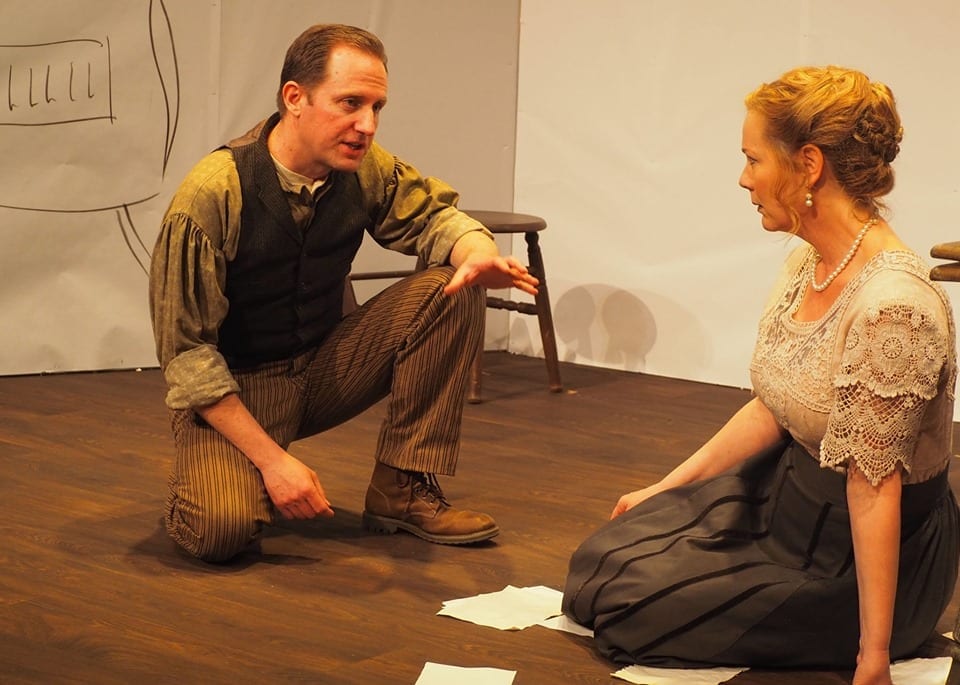SALT LAKE CITY — In her new play, Sweetheart Come, Utah native Melissa Leilani Larson deftly manages to immerse the audience in a world of longing, beauty, passion, and horror. Like the proverbial frog in the pot, I did not notice until the final bow that the storytelling had physically moved me from comfortably sitting back in my chair to a weepy huddle on the edge of my seat. Just as the protagonist, Emma Hauck, says of herself, this production is “haunted by so many beautiful things.”

The PYGmalion Theatre Company‘s cast of three are more than up to the challenge of Larson’s heady dialogue and fully-realized characters. Christy Summerhays, in the role of Emma Hauck, has her full powers on display. Summerhays as Emma is by turns charming and broken, vulnerable and determined. Emma is a bright and educated woman with a gift for writing but who is crippled by social anxiety. She is especially terrified by the prospect of being a politician’s wife, which is the unfortunate expectation of her ambitious husband. In the role of her husband Michael, Patrick Kintz, is loving and encouraging of his talented wife, but is often frustrated by her inability to live up to his hopes. Michael is often taken away from home by his busy political calendar. Emma, though devoted to her husband, takes solace in the presence of her hired gardener, August, played by Roger Dunbar. Though opposite in many ways, these two characters are drawn together by a shared love of beauty in music and poetry. Dunbar’s physicality is a powerful match for Summerhays’s command of words. Kintz has a strength and steadiness in his manner that provides stability to Emma’s vulnerability. If you think you see where this triangulation of characters might be leading, I assure you that you are both very right and very wrong.
The simple but clever paper walls of the set, designed by Thomas George, serve as the canvas for Emma’s thoughts as the play progresses. Their delicacy is an apt symbol for Emma’s state of mind. Emma writes letter after letter to her beloved Michael, always inviting him to come back to her though he may only be a few feet away. Her words scrawl across pages and onto the walls themselves. Light- and sound-scaping by Pilar I and Mikal Troy Klee respectively add to the sense of haunting beauty that sweeps across the production. Andrea Davenport’s costumes are excellent supports to the actors’ physicality and character building.
While at first glance the play is straightforward in its high-talk, low-action plot, it belies the deep questions explored regarding the nature of womanhood, intimate relationships, and mental and emotional health. As the story unfolds, Emma shares her history of childhood trauma, her anxieties as a mother, and her fraught relationship with her own body. In the first conversation of the play, she asks August to act as her emissary to the people of the town who seem to only know her as her husband’s pretty wife. She strongly resents any valuation given for her pretty face alone. She wishes to be known for her ideas, and yet her anxiety about failing to live up to expectations renders her all but mute outside her own home. Her zest for life and love of beauty is haunted by a constant pressure to fulfill the expectations placed on her in her roles of respectable wife, doting mother, grateful daughter, and responsible homemaker. She is reminiscent of Ibsen’s Nora from A Doll’s House, and I found myself wondering what she might have been if she were freed from all those constraints. This story, based on the real Emma Hauck, has much to say to a modern audience, and so accept my invitation: Sweetheart, Come.
[box]PYGmalion Theatre Company’s Sweetheart Come plays at the Rose Wagner Center for the Arts (138 Broadway, Salt Lake City) from May 5 to 18, 2019 Thursday-Saturday at 7:30 PM with Saturday matinees at 2 PM. Tickets are $20. For more information, please visit their website.[/box]
